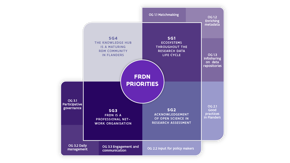FRDN's vision and strategy
FRDN promotes the sharing and re-use of Open and FAIR research data as part of Open Science. FRDN designed four strategic goals to support this. Discover FRDN’s vision on Open Science, Open & Fair Data below as well as FRDN’s four Strategic Goals.

FRDN's vision on Open Science
Research transcends national borders and boundaries between science, society and business are fading. Digitization is a key factor that drives these changes but also creates new possibilities. Open Science is a movement that aims to make the best use of these possibilities. It fosters new ways of doing research e.g. by sharing and opening up data and by handling research data properly.
For full definition on Open Science, FRDN supports the UNESCO Recommendation on Open Science. Find out more here.
FRDN's vision on open & FAIR data
As a network on research data, FRDN’s primary focus is on Open and FAIR data as part of Open Science. FRDN follows the FAIR principles as defined by GO-FAIR, which means that data can be Findable, Accessible, Interoperable and Reusable. These principles can be applied in a modular way. In this way, research data can be more or less FAIR, depending on how far a researcher goes in applying the FAIR principles.
Find out more about FAIR principles here.
FRDN’S Strategy

Following our mission and vision statement, we identify four strategic goals (SG) for FRDN:
- (1) Designing ecosystems throughout the research data lifecycle: FRDN aims to design research ecosystems to create optimal conditions for researchers to publish, exchange and reuse FAIR (meta)data. For this policy period, we will focus on 1) creating general matchmaking tools for cross-institutional collaboration on data infrastructures and services, 2) optimizing metadata collection and publication processes, and 3) sharing information on discipline-specific data repositories.
- (2) Collaborating on recognizing and raising awareness of Open Science in research assessment, the FRDN aims to foster a cultural shift in how science is evaluated and incentivized, emphasizing the significance of the working groups Architecture and RDM. Researchers must increasingly recognize the advantages of adhering to FAIR (meta)data principles, not only in their publications but also in their datasets, software, and other research outputs. Urgently needed is an incentive system that encourages researchers to make their work FAIR and openly accessible. FRDN's mission encompasses disseminating information regarding sound research assessment practices throughout Flemish research institutions and offering valuable input to policymakers..
- (3) Further developing FRDN as a professional network organization of research institutions: Enabling and sharing of (FAIR) research (meta)data is a complex challenge that cannot be tackled by a single organization. Therefore, FRDN aims to connect research performing organizations and foster collaboration through a professional network organization that facilitates knowledge exchange and innovation through participative governance.
- (4) Further developing the Knowledge Hub as a community of research data professionals: The network organization will be flanked by an open, interactive community of Research Data Management professionals, the Knowledge Hub, which will focus on cross-institutional exchange of expertise and experience, peer-to-peer learning and knowledge exchange.
More info about our operational goals (OG) coming soon!